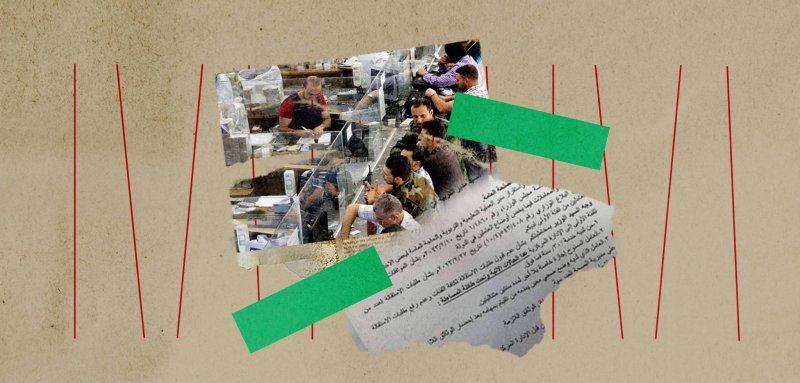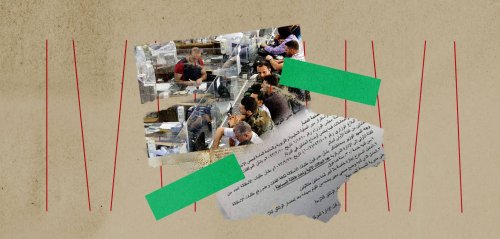Earlier this year, Syrian President Bashar al-Assad issued an administrative order dismissing about 7,000 officers and personnel from the Syrian army. According to the Ministry of Defense, “His Excellency issued an administrative order requiring about seven thousand volunteers who have special social and humanitarian conditions, be referred to the retirement pension based on their request.”
To many Syrians, this decision came as a surprise; 7,000 soldiers represent almost an entire combat military division and Syria is still at a state of war and in a dubious state of power-sharing.
The northwest of Syria is controlled by the al-Nusra Front, ‘Hay'at Tahrir al-Sham’, whereas the north is dominated by Turkey and the national army it supports. The northeast is controlled by the United States and the Syrian Democratic Forces, and the American al-Tanf base and growing ISIS operations dominate the east. In the south, Syrian authorities maintain symbolic representation.
Many Syrians question whether this signifies an imminent war, and if the dissolution of the army is imminent, paving the way for financial control over field decisions? Last year saw mass resignations across all Syria’s sectors. Certainly, the army will not be exempt from this ‘withdrawal revolution’.
At the beginning of the year, President Assad issued an administrative order dismissing about 7,000 officers and personnel from the Syrian army. What does this decision signify? Some Syrians are left wondering whether war is imminent.
The phenomenon
Raseef22 spoke to a number of sources who all agreed that meager monthly salaries in Syria were to blame for their poverty and for being unable to ensure a decent standard of living. Today, operating a small coffee stand, colloquially known as a basta, could generate at least three times the monthly income of a government employee.
In 1920, the first national unity government was formed under the leadership of Hashim al-Atassi following the French occupation of Syria. The ruling class rushed to occupy government roles, regardless of the position. This pattern remained prevalent until 2011. People paid significant bribes for employment in government institutions that offered a respectable income, a more than decent livelihood, health benefits, and various other privileges. Government salaries plummeted from close to $1,000 per month before the start of the war, in 2011, to a mere $14 per month in 2024.
Resignation or migration
Government observers and Syrian research centers did not anticipate the sudden mass resignations. Syrians have opted to stay home, or to migrate to Somalia, Tanzania, Sudan, the Gulf, Egypt, and Europe, despite the risks and dangers associated with migration. Despite the war that has engulfed Syria for well over a decade, authorities were still surprised by the mass resignation of employees across sectors.
The psyche of the future nation
There are no accurate and reliable statistical centers in Syria. Without a census or any accurate information on the local population, Syrians are left speculating what the current population of Damascus is. There are also no accurate reports outlining the number of employee resignations.
In 1920, the first national unity government was formed following the French occupation of Syria. The ruling class rushed to occupy government roles, and did so until the war in 2011. Government institutions offered various privileges, and salaries before the start of the war were close to $1,000 per month. Today, government salaries are a mere $14 per month.
In order to better understand the situation, one could either visit the institutions affected by the mass resignations, or ask the employees directly about the resignations within their sector.
A government source informed Raseef22 that thousands of resignation requests were accepted in the first half of last year. In Suwayda, the small southern city, there were 400 accepted resignations, and thousands more are currently being considered. Some institutions receive up to 10 resignation requests daily.
Special methods
Although employment has been dwindling in Syria for a while, mass resignations reached a peak in 2023. The first ministry to yield was the Ministry of Education, setting conditions for resignation, requiring 30 years of service for teachers in schools and securing a replacement, confirming that this will not affect the progress of the educational process. In December 2023, the minister justified his decision by citing the presence of a surplus of teachers in some cities.
Government observers and Syrian research centers did not anticipate the sudden mass resignations. Syrians have opted to stay home, or to migrate to Somalia, Tanzania, Sudan, the Gulf, Egypt, and Europe, despite the risks and dangers associated with migration.
Lamia Al-Soufi, a Damascus-based teacher, obtained a discharge to be reassigned to an administrative role at an elementary school. However, by September 2023, she found herself teaching again after a decision was issued at the start of the school year to end the discharge of all teachers and return them to the classroom.
She says, “Is there a shortage in Damascus? Where is the surplus, then? Is it in Deir ez-Zor? This is an unacceptable state of disorder. I am 36 years old and need 18 years to resign according to the conditions. Is this logical? I am now proceeding with my resignation proceedings, and it will succeed, as it did for all the teachers before me. The most beautiful thing about Syria is that nothing is impossible, like obtaining documented medical reports with a little money and connections.”
Al-Soufi emphasized the magnitude of the vacuum in Syria’s public education sector. She attributes this to the crushing economic situation and believes that in a few years, there will be no teachers left because young talent immediately migrate upon completing their education and reject government jobs from the outset.
Even security!
During the war, massive numbers of employees abandoned their positions without proper resignations or authorizations. Many faced disciplinary or terrorist court rulings. Provided they went back to their jobs, many benefited from presidential amnesty decrees thereby exempting them from legal penalties.
But before and after that, assuming the employee's good faith and the submission of their resignation operationally through the administrative hierarchy, this would surround them with the security apparatus in all its relevant branches, for questioning, clarification, verification, inquiry, and checking the real motives for resignation – whether they fall under 'collusion' clauses hostile to the country and its institutions or exist within their appropriate context. The security apparatus might have understood, even if belatedly, that resignation is the correct and sound state, and the predicament lies in staying for another year in government service. Otherwise, 7,000 soldiers wouldn't have submitted discharge requests.
A large number of security personnel have also submitted requests for dismissal alongside regular officers. In Syria, one either earns a substantial amount of money, regardless of the method, or succumbs to a life of poverty without mercy.
The security file
Tha'er A., an employee at one of the directorates affiliated with the governmental Real Estate Department, spoke to Raseef22 about his lengthy and complicated road to submitting his resignation, which took eighteen months. The Ministry deferred every request without explanation.
He explains, “In the last six months, my file was transferred to political, military, air, and state security to look into my identity, situation, motives, and verifying my justifications. Security questioned my colleagues, friends, neighbors, and even my local baker. They interviewed me, visited me, and interrogated me politely and calmly. This continued until I finally gained permission to resign. I am now in Dubai, and it is clear to me that my previous job was sucking the life out of me and killing my passion. Damascus could have become Dubai, if not for its many years of pain.”
“I paid to be able to resign! I paid the manager, the general manager, the minister, and the security and inspection personnel,” confesses a former municipal employee.
"Is there anything stranger than this?"
“I paid to be able to resign! I paid the manager, the general manager, the minister, and the security and inspection personnel,” confesses a former municipal employee. The man, who opted not to disclose his name, finally obtained his resignation mid-last year, after many rejected resignation requests.
He tells Raseef22, “I was tied to an annual contract with the government institution where I worked. Initially, they approved my extended leave, then I tried to travel legally to the Gulf after booking the ticket and getting a residency. The police stopped me at the airport, brought me back to Damascus, and told me to get a written approval from my minister. The minister told me to submit my resignation, so I did, but he did not approve it. How bizarre is that?”
He adds, “After a torrent of money and pulling strings, I obtained the signature on my resignation. Ironically, I was an employee in an institution where I had no office or work. I, like thousands of others, was just a useless extra. We don't provide services or serve citizens in the context of masked unemployment. Still, they cling to us for unknown reasons. I won't forget to thank the state security in all its branches, which eventually informed me that my file stated, 'A positive supporter with non-political or suspicious health reasons.'’
“I tried to travel, but I was stopped by police at the airport. They brought me back to Damascus and instructed me to get a written approval from my minister. The minister told me to submit my resignation, so I did, but he didn't approve it. It makes no sense”
The promise of migration
For many, government jobs are still associated with security and stability. However, people have come to see these roles as stifling. Escape comes through migration, which has almost emptied the country of its youth. Some Syrians in the UAE have even said that they now have more acquaintances there than they do in their native country.
Raseef22 is a not for profit entity. Our focus is on quality journalism. Every contribution to the NasRaseef membership goes directly towards journalism production. We stand independent, not accepting corporate sponsorships, sponsored content or political funding.
Support our mission to keep Raseef22 available to all readers by clicking here!
Interested in writing with us? Check our pitch process here!









